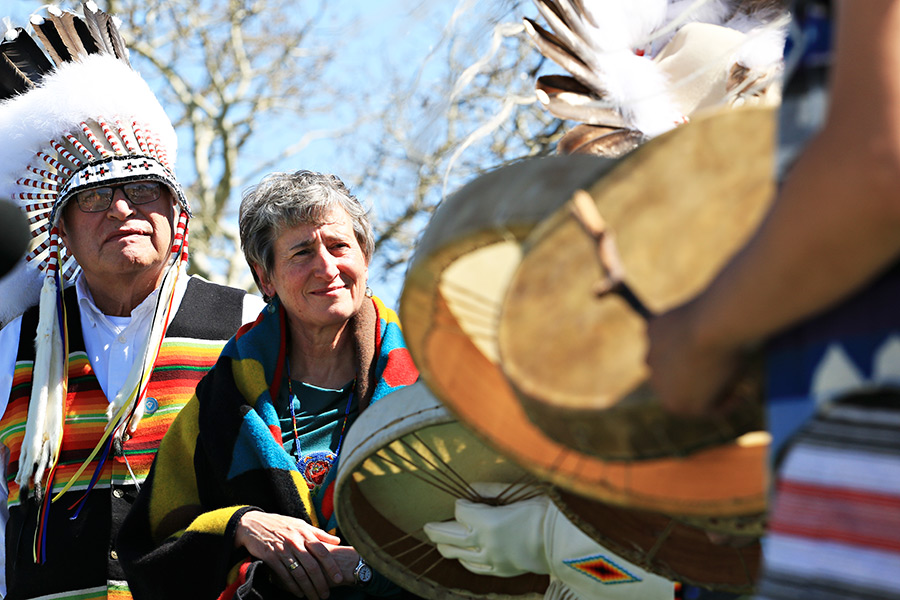Interior Secretary Visits Browning to ‘Cement Gains’ in Indian Country
Sally Jewell commemorates land buy-back program, tours reservation
By Justin Franz
BROWNING – With just eight months left in office, Secretary of the Interior Sally Jewell visited the Blackfeet Indian Reservation last week to “cement the gains” the federal government has made in Indian Country in the last seven-and-a-half years.
At the center of President Barack Obama’s effort to strengthen Native American communities has been a $1.9 billion Buy-Back Program that acquires fractional ownership on parcels of reservation land and places it in trust for tribal use. On May 3, Jewell visited Browning to celebrate the implementation of the program on the Blackfeet Reservation where more than $100 million will be spent in the coming years.
Jewell said the Buy-Back program – which resulted from Elouise Cobell’s historic lawsuit against the federal government – would help correct decades of mismanagement of tribal land.
“This program is about righting past wrongs,” Jewell said. “We want to get this land into the hands of the Blackfeet so they can do things with the land that can’t be done with it right now because its ownership is so fractured.”
According to the Department of Interior, in 2012 there were more than 2.9 million factional interests across Indian Country. Over the past century, land in Indian County has become fractionated because the children of individual owners would inherit undivided common ownership interests in the land. When those inheritors died, their children and family would take the land and within a few generations dozens of people would own one piece of land. In one extreme instance, a single tract of land on South Dakota’s Crow Creek Reservation had more than 1,200 owners.
The division and sale of reservation land to individual tribal members was authorized under the Dawes Act of 1887.
The mismanagement of land and trust funds was at the center of Cobell’s class-action lawsuit against the federal government that was settled in 2009 for $3.4 billion; $1.4 billion went to the plaintiffs and the rest was set aside to repurchase and de-fracture land.
Since the Department of Interior’s Land Buy-Back Program began in 2013, the government has paid more than $740 million to individual landowners and restored nearly 1.5 million acres to tribal governments. The department has entered into an agreement with 31 different tribal nations across the country, including the Confederated Salish and Kootenai and Blackfeet tribes. From 2013 to 2015, 739 individuals were paid more than $10 million for land on the Flathead Reservation. The purchases resulted in 6,490 acres being restored to the tribe’s ownership.
During her visit to Browning, Jewell said tribes have used the restored land across the country to build community housing, water treatment plants and electric facilities.
According to the Interior Department, there are 6,747 fractured tracts of land on the Blackfeet Reservation held by 8,164 people, totaling 812,094 acres, or about 60 percent of the reservation. Officials said the Blackfeet Reservation has the third highest amount of fractured land in the United States.
The compact signed by Jewell and Blackfeet Tribal Business Council Harry Barnes allocates $107 million to buying land on the reservation. During her speech commemorating the compact, Jewell credited Blackfeet leaders like Cobell and Chief Earl Old Person, who gave the Secretary of the Interior a Blackfeet name, “Far Away Woman.”
“It was people like Elouise Cobell, Chief Earl Old Person and so many other leaders who took on the federal government that made this possible,” she said.
During the ceremony, U.S. Sen. Jon Tester announced that he was posthumously nominating Cobell for the Presidential Medal of Freedom, the highest award that can be bestowed to a civilian.
Jewell said despite the hefty price tag that will be spent on the Buy-Back Program between now and 2022, the $1.9 billion would still not be enough to purchase all of the fractured land in the country. She said she was optimistic that Congress would eventually extend the program.
“An extension of this program would have to be based on success,” she said. “At the end of the 10-year period, if we can show that this program has been successful, it will make it a lot easier to get more money for it.”
During her two-day visit to the Blackfeet, Jewell met with tribal officials and went on a tour of facilities owned by the Department of the Interior and Bureau of Indian Affairs, including the Browning jail, the Blackfeet Dormitory and the Museum of the Plains Indian. Chairman Barnes said he hoped Jewell would realize that more should be spent on those facilities.
“A lot of this infrastructure is outdated,” Barnes said, pointing at a cracked floor in the Museum of the Plains Indian.
Other topics that officials addressed were the outstanding oil leases within the Badger-Two Medicine, a piece of land within the Lewis and Clark National Forest snugged between the reservation and Glacier Park that many Blackfeet consider sacred. Jewell recently canceled a number of outstanding oil leases and tribal officials encouraged her to cancel the remaining ones. Tribal officials also urged Jewell to support the Blackfeet Water Compact that is currently languishing in Congress. Before it can be passed it needs a letter of support from the Department of Interior.
Although there are many issues facing Indian Country today, Jewell said a lot of progress has been made across the country in recent years and that she hoped it would continue.
“We want to cement all of the gains we’ve made in Indian Country,” she said.